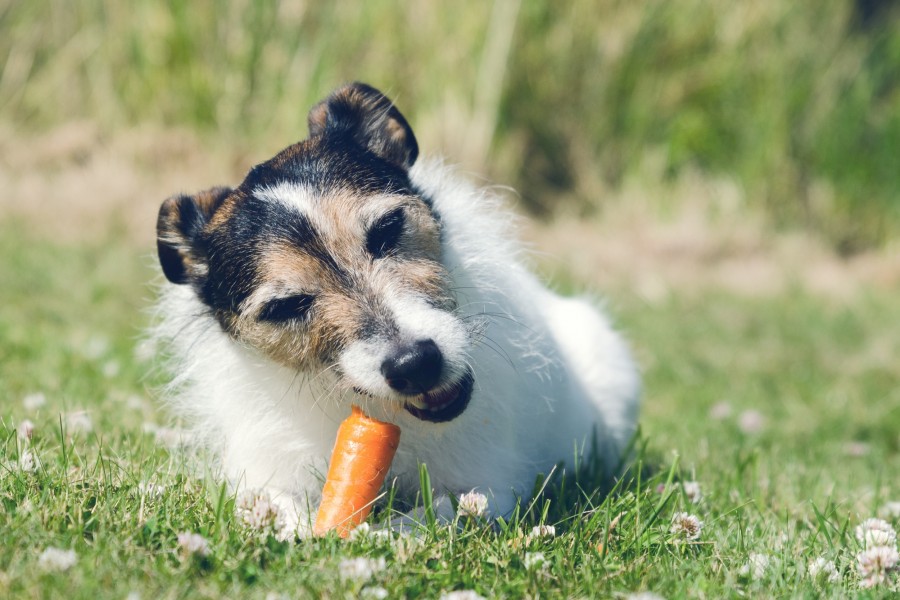Vegetables Your Dog Can Eat

It’s fun to be able to share food with our dogs: Both ends of the leash get enjoyment out of it! Veggies are healthy for everyone and can make a nice low-calorie treat for dogs. But when you feed vegetables to your dog, you need to make sure they are safe for them, as not all are. It’s important to not accidently feed your dog something that is poisonous! Here is a list of some vegetables your dog can eat safely.
Sweet Potato
Found in a lot of dog foods as an alternative to white potatoes, sweet potato is safe for dogs to eat. It even has some health benefits like supporting digestive health with a high fibre content. Sweet potatoes also contain vitamins B6, C, and A. Being low in fat, they are a good snack for the dog that’s watching their weight. You can mix canned sweet potato into your dog’s kibble (make sure nothing has been added like spices or sugar!). Dehydrated sweet potatoes makes a nice chewy treat.
Pumpkin
We all know pumpkin is amazing for your dog’s digestive system. It’s also low in fat and promotes urinary tract health. Like sweet potato, you can put canned pumpkin on your dog’s food: it can help with both constipation and diarrhea. Canned pumpkin is actually a bit more nutritious than fresh, since fresh contains more water. Pumpkin is also a great flavour base if you are making your own dog treats at home.
Carrots
If you have a dog that is on a diet and/or always acts hungry, carrots can be a good solution. Carrots contain high levels of vitamin A, fibre, potassium and beta-carotene, a powerful anti-oxidant that aids in improving eyesight. A whole frozen carrot can be great for a teething puppy. Cut up, they make great, low-calorie training treats. You can also give your dog cooked carrots.
Green Beans
Another treat many dogs like, green beans are rich in vitamin K, riboflavin, dietary fibre and niacin. Like carrots, they can make a great training treat for dogs that need to watch fat or calorie intake.
Acorn Squash
Not a vegetable you see people talking about much, but acorn squash is safe for your dog to eat and has some benefits too! Like pumpkin, it’s rich in vitamins A, C, B6, and E, minerals (including potassium, magnesium and calcium), dietary fibre and antioxidant compounds. Being 90% water, fresh acorn squash can help a dog with digestive trouble, or if you are worried your dog is not drinking enough.
Green Peas
Peas are found in some dog foods and contain some great nutrients including folate, manganese, magnesium, thiamin and phosphorus. Frozen peas are great for training treats too!
Spinach
Spinach is safe for dogs as well, though maybe not as palatable to most as some veggies on this list. It is a great source of vitamin K, magnesium, folate, manganese and zinc.
Broccoli
Broccoli is safe for dogs and is an excellent source of vitamins K, C, B6, E and A, fibre, phosphorus, potassium, and magnesium. Just remember that broccoli can have the same effect on dogs as it does people, so if your dog starts to emit unsavoury fumes, you may want to forgo this treat. Dogs with digestive trouble should avoid. If you feed it cooked, leave off the cheese and salt!
Brussel Sprouts
Brussel Sprouts are also safe for dogs, but can also cause gas. If your dog does not seem bothered by them, however, they do have antioxidants, vitamins including K and C, and fibre.
Zucchini
Safe for dogs, zucchini is full of good nutrients! It is an excellent source of manganese and vitamin C, as well as a good source for magnesium, vitamin A, dietary fibre, potassium, copper, folate and phosphorus. But that’s not all! Zucchini is also a good source of vitamins B1, B2, B6, calcium, zinc, niacin and protein. Like carrots, you can give it to a teething puppy frozen, or slice it up for training treats.
Beets
Another vegetable that is safe for your dog is beets. Though some may not be a fan of the taste, they offer vitamin C, fibre, manganese, potassium and folate. Just make sure your dog does not carry them around the house, or you will have beet stains everywhere!
Celery
Celery is safe for dogs to eat and is low in calories, making it good for treat training and for dogs needing to watch their weight, but always seem hungry. A frozen stick is great for teething puppies! Celery contains vitamins A, K, C and B5, thiamin, riboflavin, niacin and fibre. It also has anti-inflammatory properties that can help dogs with joint issues.
Just remember that, like everything else, feed vegetables to your dog in moderation. Anything, even something healthy, can be bad if fed too much. Take your dog’s size into consideration when sharing treats or adding fresh veggies to their food. A teacup Chihuahua can only eat a tiny amount, whereas a Great Dane could be fed more. Also watch for signs of allergies or sensitives and stop feeding if you see itching, vomiting, and/or diarrhea. It’s best to introduce new foods one at a time and in small amounts, so you know which is the culprit. Otherwise, toss up that salad and save some for your dog: it’s good for you both!

Are dogs able to eat corn?